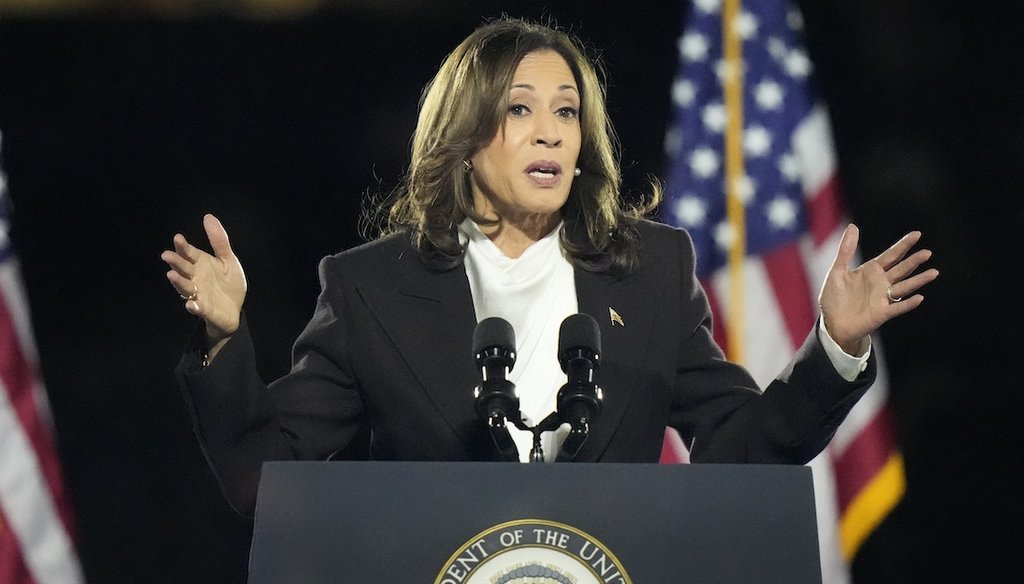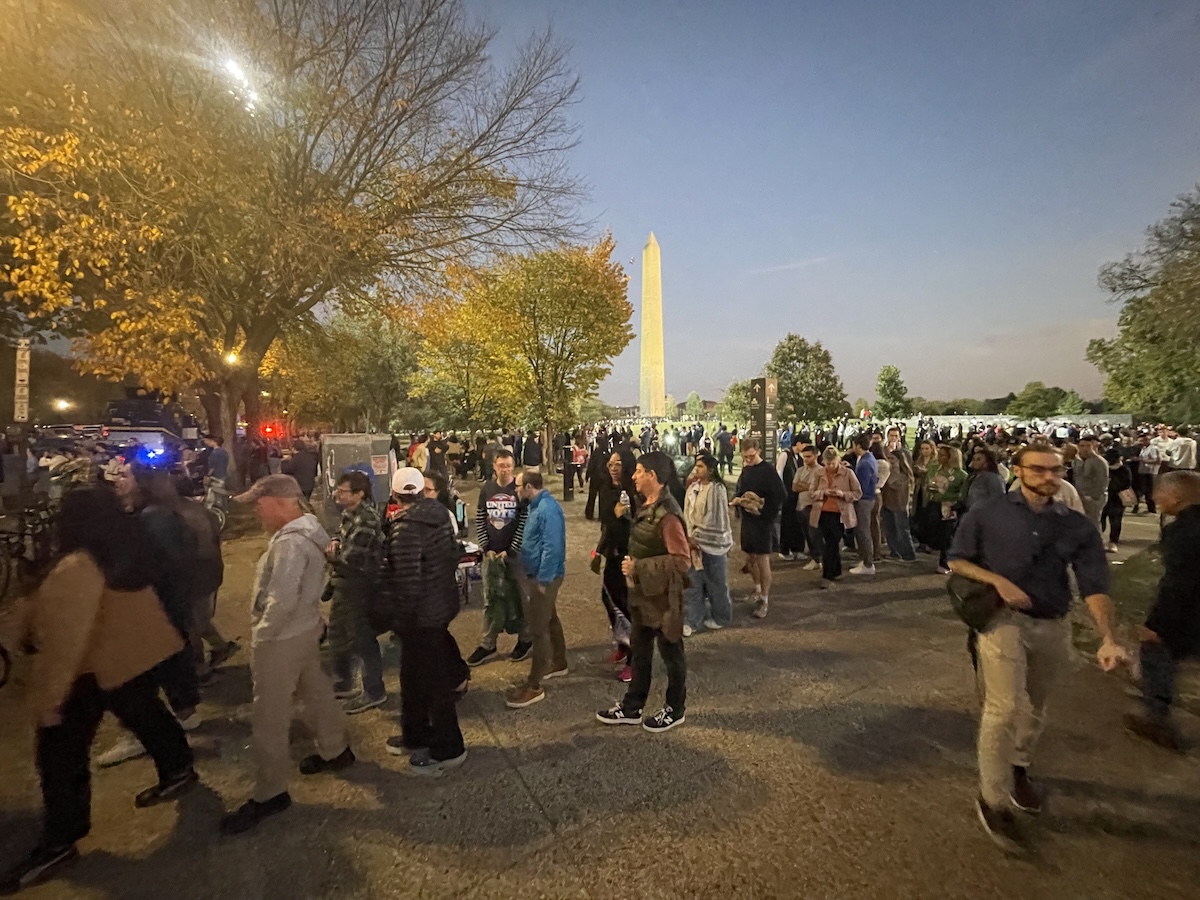WASHINGTON — In a speech from the Ellipse adjoining the White House, one week from Election Day, Vice President Kamala Harris drew a sharp contrast with former President Donald Trump, calling him a "petty tyrant" and repeating a line she has used in recent days, that she would begin her presidential term not with an enemies list, but with a to-do list.
Harris spoke at the site where Trump delivered his "Save America" rally ahead of the Jan. 6, 2021, Capitol riot. During the Oct. 29 speech, Harris said Trump had been "at this very spot … and sent an armed mob to the United States Capitol to overturn the will of the people in a free and fair election."
In her speech’s first half, Harris focused on the risks she believes Trump poses for the country. Later, she shifted toward policy, distinguishing parts of her agenda on taxes, abortion and immigration with Trump’s.
"Politicians have got to stop treating immigration as an issue to scare up votes in an election," she said, "and instead treat it as the serious challenge that it is."
Attendees gather near the Washington Monument as they await Kamala Harris' speech on the Ellipse in Washington, D.C., on Oct. 29, 2024. (Louis Jacobson/PolitiFact)
Here’s a rundown of six notable moments, fact-checked.
"He says that one of his highest priorities is to set free the violent extremists who insulted those law enforcement officers on Jan. 6."
Harris accurately said 140 law enforcement officers were injured in the Jan. 6, 2021, attack. Trump has repeatedly called the defendants charged in the attack "hostages" or "warriors" and promised to pardon those who stormed the Capitol.
In September 2022, two months before he announced his campaign, Trump told conservative radio show host Wendy Bell that he had met with some of the Jan. 6 defendants. "I will look very very favorably about full pardons," he said, adding, "I mean full pardons, with an apology to many."
In a March Truth Social post, he vowed that one of his "first acts" as president would be to "Free the January 6 Hostages being wrongfully imprisoned!" And he told Time magazine in April he would "consider" pardoning every one of them.
More than 1,500 defendants have been charged in the storming of the Capitol, Justice Department data shows. About 571 were charged with assaulting, resisting, or impeding law enforcement agents or officers or obstructing those officers during a civil disorder, including approximately 164 defendants charged with using a deadly or dangerous weapon or causing serious bodily injury to an officer.
"Trump intends to use the United States military against American citizens who simply disagree with him. People, he calls, quote, ‘the enemy from within.’"
Trump has repeatedly talked about the "enemy from within" in his October speeches and interviews.
Trump told Fox News’ Howard Kurtz on Oct. 20 that Reps. Adam Schiff and Nancy Pelosi, both D-Calif., are "the enemy from within." But Trump is often vague when he uses this phrase. Trump says that the "enemy from within" is a "bigger enemy" than foreign enemies, such as China or Russia.
He sometimes uses the phrase shortly after speaking about President Joe Biden or Harris, as he did Oct. 27 in his Madison Square Garden rally in New York City.
"We’re running against something far bigger than Joe or Kamala and far more powerful than them, which is a massive, vicious, crooked, radical left machine that runs today’s Democrat Party. They’re just vessels. In fact, they’re perfect vessels because they’ll never give them a hard time. They’ll do whatever they want. I know many of them. It’s just this amorphous group of people. But they’re smart and they’re vicious. And we have to defeat them.
"And when I say ‘the enemy from within,’ the other side goes crazy … ‘How can he say now they’ve done very bad things to this country?’ They are indeed the enemy from within. But this is who we’re fighting."
On Oct. 13, Fox News’ Maria Bartiromo asked Trump about the possibility of Election Day chaos. Trump warned of "very bad people," "radical left lunatics" who should be handled if "necessary" by the National Guard or the military.
Trump would "ban abortion nationwide, restrict access to birth control and put IVF treatments at risk and force states to monitor women's pregnancies. Just Google project 2025 and read the plans for yourself."
This is misleading.
Since April, Trump has consistently said abortion legislation should be left to the states. He has said that he would not sign a national abortion ban. As president, however, Trump endorsed a 20-week national abortion ban. Early in his 2024 presidential campaign, he floated support for 15- or 16-week federal abortion bans, news outlets reported.
Trump said in a May interview that he was "looking at" birth control restrictions, but he quickly tried to clarify his words, writing on Truth Social that "I have never and will never advocate for imposing restrictions on birth control."
Trump has expressed support for in vitro fertilization during the 2024 campaign amid Democratic criticism that Republicans want to restrict or eliminate the practice. In April, he released a video in which he said he supports making it "easier" for families to have babies, not harder. "That includes supporting the availability of fertility treatments, like IVF, in every state in America," Trump said. He has also recently proposed having the government cover IVF costs or requiring insurers to do so. He hasn’t said how he would do this.
Nothing in Trump’s Agenda 47 requires states to monitor women’s pregnancies. Instead, Project 2025, the Heritage Foundation’s 900-page conservative policy manual for the next Republican administration, proposes withholding federal money from states that don’t report more detailed information about how many abortions take place in their states, as well as other statistics for miscarriages and stillbirths to the federal government. The project doesn’t call for the monitoring of all pregnancies.
Trump would pay for his tax plan with "a 20% national sales tax on everything you buy that is imported. ... A Trump sales tax that would cost the average family nearly $4,000 more a year."
Half True.
Trump has discussed raising tariffs across the board by 10% to 20%, so the 20% figure Harris cited is on the upper end of what Trump has said. Tariffs are also not technically part of the tax code, but their effect on consumers would be similar in costing them more money.
The $4,000 Harris cited is on the upper end of independent estimates. Two estimates we found broadly support Harris’ $4,000 amount. Two others show a smaller — though still significant — effect, in the $1,700 to $2,600 range.
"You will pay even more if Donald Trump finally gets his way and repeals the Affordable Care Act, which would throw millions of Americans off their health insurance. And take us back to when insurance companies have the power to deny people with preexisting conditions."
Half True.
In his 2016 presidential campaign, Trump promised to repeal and replace the Affordable Care Act, and as president, he supported congressional Republicans’ failed efforts to achieve this.
During his 2024 campaign, Trump’s position has vacillated. At times, he’s said that he wants to replace the law with an "alternative." But in March, he wrote on Truth Social that he’s "not running to terminate" the law and instead wants to make it "better" and "less expensive."
During the Sept. 10 presidential debate with Harris in Philadelphia, Trump said he has "concepts of a plan" to replace the law, but he would "run it as good as it can be run" before instituting his own plan without providing further details.
More than 1,500 doctors released a letter Oct. 17 calling on Trump to reveal details about how he would alter the health care law, saying voters need the explanation to make an informed decision.
Trump "tried to cut Medicare and Social Security every year he was president."
This needs context.
On Medicare, Trump released four successive annual budgets that proposed cutting Medicare. However, experts are divided on how much those cuts would have hurt beneficiaries had they been enacted. Many were technical changes that had bipartisan support and would have been more likely to hurt providers than patients.
On Social Security, Trump submitted budget proposals that included cuts to Social Security. These were never implemented, because of opposition in Congress.
However, Harris glosses over what these cuts involved. The proposed cuts were focused on two parts of the program — Social Security Disability Insurance and Supplemental Security Income — not the more widely used old-age and survivor benefits.
Social Security Disability Insurance benefits people with physical and mental conditions that are severe enough to permanently keep them from working. Supplemental Security Income payments are limited to low-income Americans — older adults, or adults or children who are disabled or blind.
Although these cuts would have affected close to 10 million Americans, the pool of people who receive old-age and survivor benefits is almost seven times as large.
Trump has promised in 2024 not to cut either program.
RELATED: Follow our election live blog










































